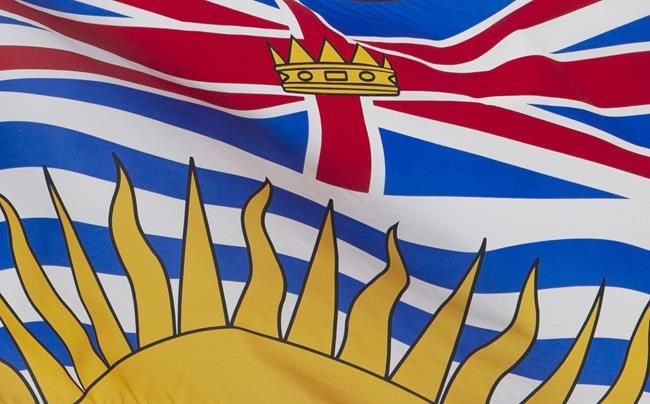
British Columbia's provincial flag flies on a flagpole in Ottawa, Friday July 3, 2020. THE CANADIAN PRESS/Adrian Wyld
Republished December 07, 2021 - 4:02 PM
Original Publication Date December 07, 2021 - 12:06 PM
VANCOUVER - Five cases of the Omicron COVID-19 variant have been confirmed in British Columbia so far among people whose illness is associated with travel to places like Nigeria and Egypt, the provincial health officer says.
Dr. Bonnie Henry said three of the people were fully vaccinated and two were unvaccinated, and all have had mild or asymptomatic cases.
"Some (cases) have been caught on both random screening and the mandatory screening at the airport," she said Tuesday of four cases that were identified on the weekend.
The first case, which was confirmed on Nov. 30, was also mild but involved someone who returned to B.C. before on-arrival testing was introduced at airports, Henry said, adding that person was followed up on and retested.
More cases of the Omicron variant are suspected, Henry said, which is creating greater uncertainty leading to anxiety and fear among many people.
"Our minds, our brains, abhor uncertainty. It's one of those things that can cause stress and depression in people and we've been living with this uncertainty for a long time. It is yet another hill in this very, very long journey," she said, encouraging people to support one another.
B.C. is ramping up its program for booster shots after prioritizing residents and staff of long-term care homes and those in the community who are over age 70, half of whom have received their third dose of vaccine.
The province recorded 326 more cases of COVID-19 on Tuesday along with one more death, for a total of 2,363 fatalities.
Henry said a booster shot is being provided to residents six to eight months after the second dose but it's not yet known if another booster dose will be required after that.
Evidence from around the world shows increasing the interval between the first two doses provides longer-lasting protection against COVID-19, suggesting another shot may not be needed to get through the next respiratory season.
"It may mean that we get a booster dose every two or three or five years. Those are questions that we'll still have to follow," Henry said, adding the overall focus should be on providing equitable access to vaccines around the world to lower the risk of creating another mutation of the virus.
All eligible B.C. residents aged 18 and up are expected to be offered a third dose of vaccine over the next six to eight months but those who are more vulnerable to so-called breakthrough infections would be first in line about six months following their second dose.
The province is also forging ahead with its immunization campaign for children between the ages of five and 11 as Henry's team monitors the data on kids to determine if they too will need a booster shot.
Earlier Tuesday, RCMP Cpl. Jennifer Cooper said protesters outside a COVID-19 vaccine clinic for children in Prince George have been warned their actions are illegal, and any parents who feel intimidated at such facilities should immediately contact police.
Cooper said about a dozen people voiced their opinions against vaccines at the clinic on Monday, and some of them followed families to their vehicles.
Officers will be patrolling the clinic, but protesters whom police have spoken with so far seemed receptive to being educated about a law passed last month against intimidation of anyone entering or leaving such facilities, she said.
It establishes a 20-metre access zone around COVID-19 clinics and hospitals and allows police to arrest violators and issue a $2,300 fine.
Cooper said people opposed to vaccines should remember their tactics could be considered intimidation by those on the receiving end, even if they believe they're merely exercising their right to peaceful protest.
Eryn Collins, a spokeswoman for Northern Health, said some protesters have previously shown up at a clinic in Prince George saying they have documentation suggesting the health authority should cease and desist providing vaccines, based on their beliefs.
"I'm hoping people who have plans or thoughts about protesting or demonstrating outside any of our locations have received the message loud and clear, that there is new legislation in effect and that there are enforcement options available to the RCMP," Collins said.
Health Minister Adrian Dix said that while people have a right to their own opinion, there's an obligation to ensure patients and staff feel safe at vaccine clinics.
"Getting a vaccine can be a stressful experience for some children and parents," he said. "They don't need the added stress that being confronted presents."
This report by The Canadian Press was first published Dec. 7, 2021.
News from © The Canadian Press, 2021